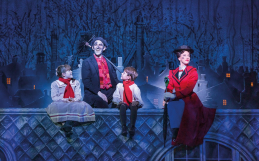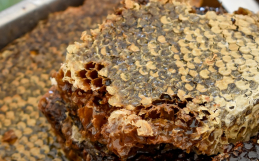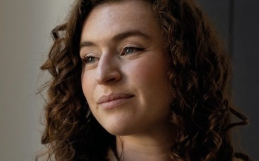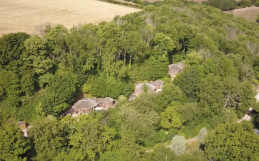By Sophie Yardley for Squarely Magazine
Lee Ellis is a Bristol-based multimedia artist and one of Bristol’s great success stories in the art world. After graduating in 2006 from the University of the West of England’s Graphic Design program, Ellis went on to work in agencies and freelance.
It was in 2019 when I first met Ellis, having been introduced through one of our club members. Whilst he was keeping busy with a number of freelance jobs, he was also heavily invested in his art journey.
At the start of 2020, we scheduled a solo show of Ellis’ works at the club. Owing to the success of the show, we continued to exhibit Ellis’ creations at another of our spaces. Soon after, Lee began his relationship with the highly respected Clarendon Fine Art, the largest commercial gallery in the U.K. Clarendon offers a platform for national and international contemporary artists to introduce their work to established and emerging collectors.
Always creative, Ellis found his penchant for expression in portrait painting. Armed with his distinctive style, Ellis’ desire to create has led to him embracing different artistic mediums—from printmaking and drawing to painting. His unusual juxtaposition of bright colours and dark subjects conveys emotional and visceral angst.
By employing heavy, raw, expressive brush strokes that make his painting style immediately affecting, he never fails to depict the inner turmoil of his subject matter.
We caught up with Ellis to find out how his most recent endeavours have been going…
It’s been quite the journey for you! How’s everything going?
It’s been an interesting few years and super fun for sure. I’ve seen my work evolve & go from strength to strength since working with Clarendon— pushing my practice in new directions that create an interesting juxtaposition of macabre portraiture and bright colours and patterns. The style is very much my own at this point and allows me to explore new themes and subjects freely. Everything is tip-top at the moment.
How did Clarendon approach you?
Well, it was an application process. I didn’t think my work would be of particular interest to Clarendon, but one of their gallery managers got in touch via Instagram and said he was a fan and that I should apply. So, I put together a portfolio and all the arty blurbs needed for the application and got on it. A month or so after applying I got the email rejecting my application. I wasn’t interested in taking no for an answer so within an hour of my rejection email I applied again. I thought, “Why not?” Turns out, it was worth it. Someone else saw the email and that kicked everything off. I started with a trial using a new body of work that was hugely popular, which led me to create more pieces for them. Late last year I decided to take the plunge and work exclusively with them. I haven’t looked back since.
How are you finding working with and being exclusive with a gallery?
I’m loving it. They arrange everything, giving me the time to paint, explore and evolve. It’s great. I guess there is a part of me that misses working with lots of different galleries, but the amount of time I get to create without the admin side of things outweighs that. I work with a few other galleries outside of the U.K. and that’s a nice way to get the work seen elsewhere.
How has your creative process evolved over the years?
It’s evolved a fair bit. The style has gone from super macabre and haunting to being less peculiar through the use of graphical elements and bright colours with hints of the mark-making and textures I’ve used previously. There’s still a heavy focus on portraiture, despite my best efforts to move on to other things; I recently painted flowers, and I tend to find my way back to the human form.
What about mixed media appeals to you?
The endless possibilities for what I can do. If I stick to one medium there’s a limit as to what I can produce, but with additional mediums, things can move in many different directions. I also find by using various mediums I can keep creative block at bay. It helps to keep things fresh and interesting, for me at least.
Your pieces tend to be fairly raw and maybe even a little dark compared to classical portraiture, is there anything specific you’re trying to reveal or investigate in your subject matter?
I focus purely on the urgent need to create and the work captures the energy and sense of urgency of the process. The portrait acts as a holding vessel I guess for my energy. How the viewer perceives the work is then left entirely up to them. I find giving the pieces obscure titles helps with this as there is no guide for the viewer. It’s completely down to them to interpret the work how they want to. What’s great is everyone sees them differently. My main objective is to fulfill my own compulsion to create.
Do you have any advice for emerging artists who are looking to make the jump from their day job to full-time artists?
My advice would be to keep creating, experimenting, and exploring different mediums. Put on shows yourself and get your work out there in any location you can. Exhibit in bars, cafés, restaurants, hotels, offices, independent galleries, etc… Do group shows, trade work with other artists, use social media as a portfolio, collate a mailing list, and don’t give up. The jump can be terrifying & doesn’t have to be a single leap into the unknown. Build up a body of work and a CV of working with galleries and putting on shows before committing to full-time artistry. That’s how I did it, I painted every single day and went from full-time employment, to freelance (I’m very fortunate that was an option), to full-time artist. I still freelance every now and then too as I quite enjoy it.
What’s next for Lee Ellis?
Good question. I don’t know. Paint some more pieces and explore the possibilities of a solo show with Clarendon. For now though, just paint some more.
To find out more visit https://clarendonfineart.com/collections/lee-ellis
To read more from Squarely, head to stage.thesquareclub.com/squarely-magazine/











